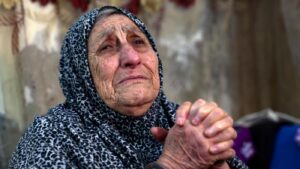Why the Nakba remains an open wound for the Palestinians

Palestinian refugee Ebthaj Dawla reacting during an interview on Nakba in her home in Gaza City on 22 February 2023
Yasir Suleiman writes in Middle East Eye:
In her book, Unclaimed Experience, trauma scholar Cathy Caruth provides a psychoanalytic framework for understanding the impact of the Palestinian Nakba in, of, and beyond itself. She defines trauma as the “story of a wound that cries out, that addresses us to tell us of a reality or truth that is not otherwise available.”
The Nakba indeed is a huge open wound in Palestinian history and memory that speaks to us, tenaciously and wilfully, to remind us of a Palestine in its totality that is not available to Palestinians.
For Palestinians living on Palestinian soil or in the shatat, the Palestinian diaspora, Palestine is the living site of a traumatic rupture that calls its victims back – reviving the image and memory of a place that for millennia was, literally, theirs.
The Nakba is the loss and never-ending search for recovery: the call to erase the erasure of the motherland and all it stands for.
For the majority of Arabs in Palestine and elsewhere, the Nakba, as trauma, represents the humiliating defeat of the indigenous people, the rightful owners of the fatherland, at the hands of a numerically weaker and usurping outsider, with naked assistance and active collusion by a morally corrupt imperial power.
Relying on the late George Tarabishi’s analysis of the defeat of 1967 as an Arab trauma, we may ascribe the lasting effect of the Nakba as a gushing wound in the war’s unforeseen and nightmarish outcome. As an open wound, the Nakba heralded further defeats which not only deepened the impact of that original defeat but also paved the way for other crushing defeats and the incremental shameful capitulations we continue to witness in the miserable Arab political scene today.
Each abyss-inducing capitulation takes us Palestinians deeper into the anatomy of that open wound which, rightly, has been described as an act of rape (“ightisab”), the rape of a homeland and its intertwined culture that will always be remembered in full bloom.
The Nakba is not an event. It is an ongoing rupture in the genealogy of every Palestinian.
